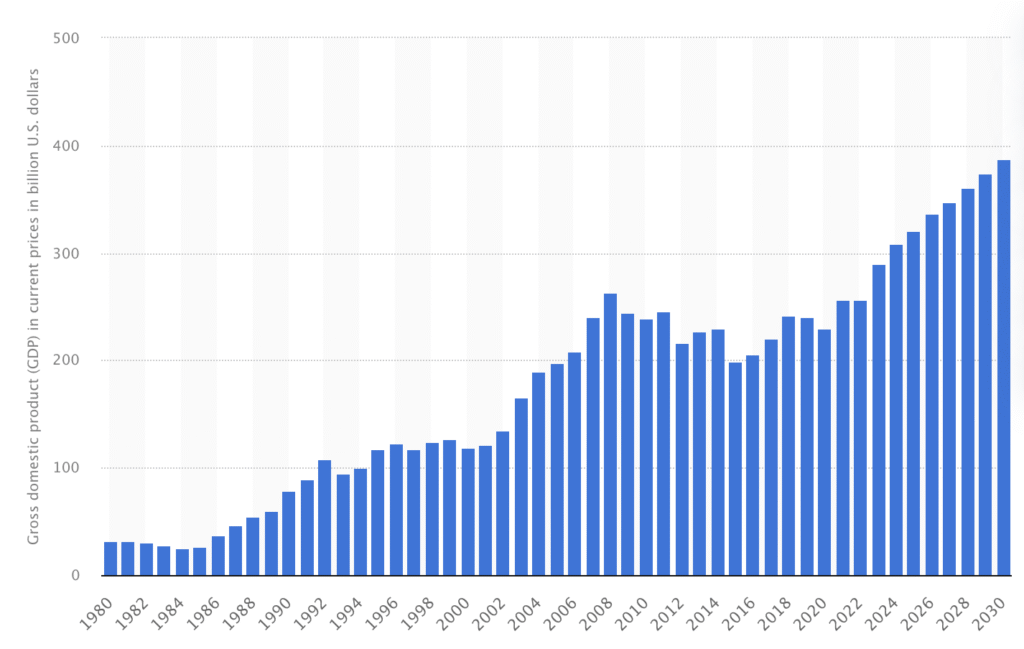How can tech companies stay resilient in times of global instability? From geopolitical uncertainty to economic tensions, today’s risks demand new strategies. Nearshoring Tech Talent to Portugal offers political stability, cost efficiency, top-tier talent, and seamless collaboration.
WHAT YOU’LL FIND IN THIS ARTICLE:
• Geopolitical Uncertainty – how global conflicts are reshaping the tech world.
• Building Distributed Teams – want to explore the best strategy for your team? Check out my e-book: Outsourcing vs Direct Hiring.
• Why Portugal is a Resilient Hub for Nearshoring Tech Talent – high-quality education, a thriving tech community, competitive salaries, time zone alignment, and language advantages.
• CEO Thoughts – how to turn instability into opportunity.
As the US-China tech rivalry hardens, the Russia-Ukraine war drags on, fresh flashpoints shake the Middle East, and the return of Donald Trump to the Oval Office looms over global diplomacy, political risk is no longer a distant headline—it is a boardroom variable.
For tech companies, geopolitical uncertainty dictates where critical engineering talent can safely sit, how cross-border teams are assembled, and how resilient their roadmaps truly are.
Europe faces heightened pressure, including:
- Energy volatility
- Cybersecurity risks
- Shifting alliances
- Growing defense spending demands, as a result of escalating global tensions
These global and local dynamics require tech companies to think beyond performance and prioritize long-term adaptability. Building resilient teams across stable markets is becoming a strategic necessity.
The Risks for Tech Companies
Global instability, while sometimes indirect, can deeply affect the day-to-day operations of a business. From energy prices and investor confidence to hiring conditions and supply chain continuity, the impact is real. Uncertainty around economic policy can delay investments, shrink available capital, and slow down hiring plans.
The tech sector is particularly vulnerable. Rapid innovation depends on stable environments for recruitment, infrastructure, and product development. With tensions on the rise—whether due to geopolitical conflict or changing governments—the cost of hesitation grows.
A Safer Strategic Buffer
Nearshoring tech talent is now the decisive play for de-risking growth.
Building distributed teams in countries that offer political stability, strong digital infrastructure, and cultural proximity, allows companies to access world-class engineers, slashes geopolitical exposure, and keeps roadmaps moving when borders close or supply chains stall.
You retain cultural fit, quality benchmarks, and day-to-day oversight of an in-house squad, while gaining the speed, flexibility, and cost headroom to turn volatility into competitive advantage.
By setting up part of your team in another country, either remotely or with an on-site approach, you benefit from geographic flexibility, cost optimization, and access to talent without being tied to a volatile local environment.
Portugal, for instance, continues to offer a strong value proposition.
While the recent elections brought a new government with a stronger focus on free-market policies and private sector growth, structural advantages remain intact:
- EU alignment;
- Favorable time zone for Western Europe;
- Highly skilled workforce;
- Resilient legal and digital infrastructure.
Portugal: A Resilient Hub for Nearshoring Tech Talent
A Politically Stable Environment – Even Amid Change
The center-right government now in power is already moving towards policies that actively support private sector growth and attract foreign investment.
Still, Portugal’s political institutions are robust, and changes in government rarely disrupt the country’s long-standing commitment to EU-aligned economic stability and digital development.
This continuity helps shield the tech sector from disruptive shifts, making Portugal a safe and attractive destination for nearshoring.
Economic Momentum and EU Investment
Portugal’s economy continues on a growth trajectory. Recent EU forecasts project steady GDP expansion, aided by billions in EU recovery and resilience funds set to be distributed through 2026. These funds support infrastructure modernization, digital transformation, and public services—all essential for a thriving tech ecosystem.
According to Portugal’s National Statistics Institute (INE), the economy grew 1.5% in Q4 2024 and is expected to grow further in 2025, with continued investment expected through the EU’s Recovery and Resilience Plan.

Gross domestic product (GDP) in current prices in Portugal from 1980 to 2030 (in billion U.S. dollars). Source: Statista
The Talent Advantage
Portugal remains one of Europe’s most competitive markets for tech talent.
High-quality education, a growing tech community, and competitive salaries draw companies looking to scale efficiently.
According to recent data from Levels.fyi (based on user-reported salaries), the median annual salary for a mid-level software engineer in Portugal is approximately €40,000, while senior profiles can earn €50,000 or more, particularly in Lisbon and Porto. By comparison, similar roles in countries like Germany, the Netherlands, or Ireland often exceed €80,000 per year. This wage advantage—combined with Portugal’s competitive operational costs and high quality of life—reinforces the country’s appeal as a strategic nearshoring destination for tech companies.
Time Zone and Language Benefits
Portugal operates on Western European Time, making real-time collaboration with teams across Europe seamless. Furthermore, the Portuguese are among the most proficient English speakers in the world, rating 6th on the Global Ranking of Countries and Regions 2024, by the EF English Proficiency Index. This reduces communication barriers and enables smooth integration with international teams.

Hiring IT Talent Amid Geopolitical Uncertainty: Final Thoughts
In a world of increasing geopolitical instability, agility is everything.
Outsourcing—particularly to resilient, well-connected regions like Portugal—offers tech companies a way to adapt, scale, and thrive despite uncertainty.
Portugal’s inclusion in the EU Digital Decade policy framework, combined with over €13.9 billion allocated through Recovery and Resilience Funds by 2026, underscores the country’s commitment to becoming a digital innovation leader.
No country is immune to political change, but Portugal’s institutional stability, EU integration, and robust talent pool make it one of the safest bets for nearshoring in today’s unpredictable environment.
Ready to explore what nearshoring in Portugal can do for your tech business? Get in touch with KWAN, and we’ll help you assemble a high-performing, resilient team in one of Europe’s most promising tech hubs.

